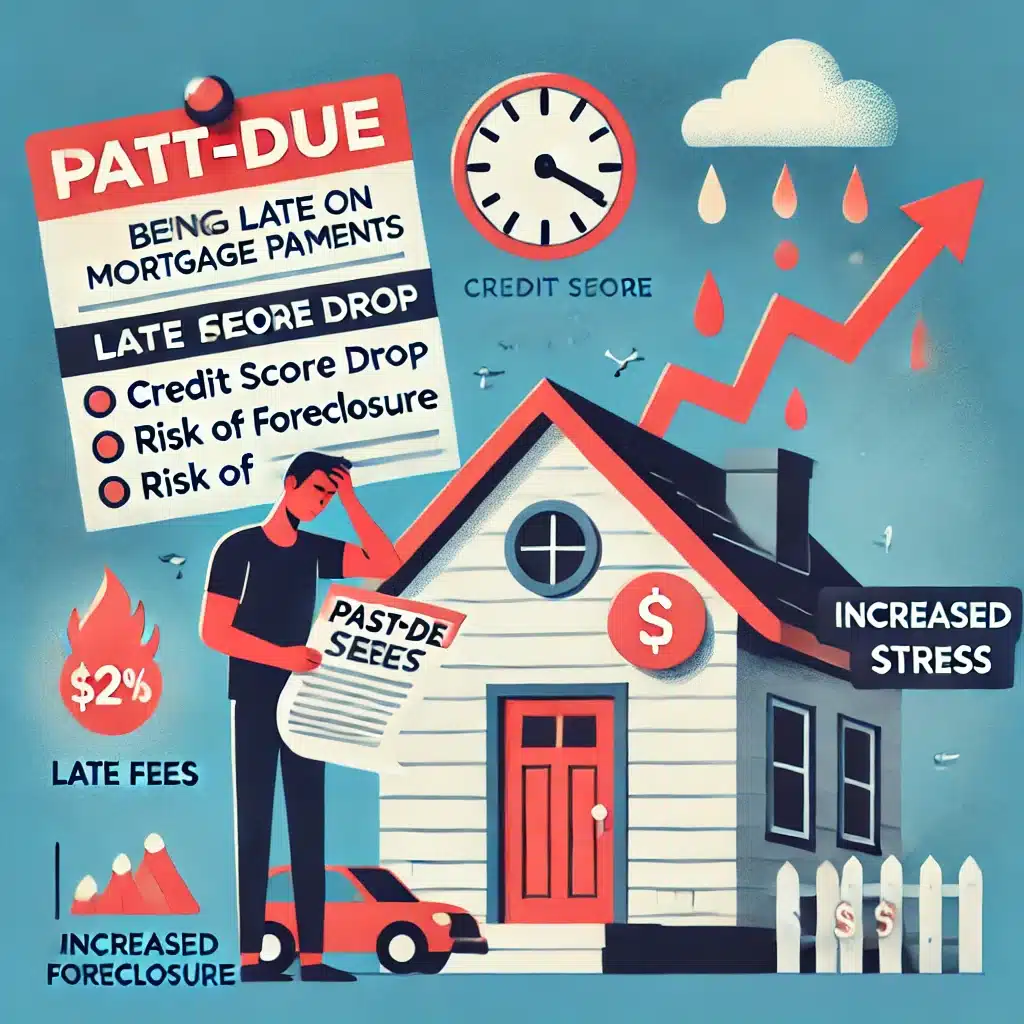
Your Credit Score Is At Risk
As you already know, almost all banks, credit cards, mortgage companies and other lenders rely on your credit score to help assess the risk of lending money to you. Paying any of your payments late – even something as small as your mobile phone bill or a department score credit card – can result in negative remarks showing up on your credit score. If you are late enough times, or fail to repay the late payment in full, then your score will start to drop.
Grace Periods: A Little Breathing Room
First things first, don’t panic if you’re just a few days late. Many mortgage lenders offer a grace period, which gives you a little extra time to make your payment without incurring a penalty. Grace periods typically range from 10 to 15 days after your due date, but you should always double-check the terms of your mortgage agreement to know exactly how long you have. If all you need is that little bit of extra time, you’re in luck! Just make sure you pay before the grace period ends to avoid any late fees or dings to your credit.
Communication is Key
If you know you’re going to miss a payment and need more than a grace period to get caught up, the best thing you can do is reach out to your lender as soon as possible. Ignoring the problem won’t make it go away—and in fact, it could make things worse. Mortgage lenders are typically more willing to work with you if they know your situation early on. Explain your circumstances and ask about any options they may have to help you out.
Some lenders may offer a forbearance plan, which temporarily reduces or suspends your mortgage payments. Others might suggest a repayment plan to help you gradually get back on track. Every situation is different, but the key is to keep an open line of communication with your lender so they know you’re serious about resolving the issue.
Late Payments and Your Credit Score
One of the biggest concerns with missing a mortgage payment is the potential impact on your credit score. Mortgage payments are a significant part of your credit history, and late or missed payments can cause your score to drop. If you miss a payment but manage to pay within the grace period, it likely won’t affect your credit score—though you may still face a late fee. However, if you’re more than 30 days late, that’s when it gets reported to the credit bureaus, and your score can take a hit.
The more frequently you’re late, the worse the impact. Consistent late payments can not only drop your credit score but also make it harder to qualify for loans, credit cards, or even a new mortgage in the future. That’s why it’s so important to prioritize your mortgage payments, even if it means cutting back in other areas temporarily.
Refinancing Can Be Affected
If you already have a mortgage, then a lower credit score can be a problem when you try to refinance. The process of refinancing involves taking out a new mortgage, in which your lender will reassess your risk using your credit score as one of the indicators. If you have been making late payments, you might end up having to settle for a higher interest rate or you may even be declined for the new mortgage.
What Happens If You Keep Missing Payments?
If you miss multiple mortgage payments, you could be facing more serious consequences. After missing a payment for 90 days or more, your lender may start the foreclosure process. Foreclosure is the legal process where the lender takes ownership of your home because you haven’t been able to keep up with your mortgage payments. This is something every homeowner wants to avoid, as it not only means losing your home but also severely damaging your credit.
Fortunately, foreclosure isn’t inevitable, even if you’re behind on payments. Again, staying in contact with your lender and being proactive about your situation can make all the difference. Many lenders would prefer to help you stay in your home rather than go through the costly foreclosure process, so don’t hesitate to ask about your options if you find yourself falling behind.
The Importance of Paying On Time
The takeaway here is that paying your mortgage on time is crucial for your financial health. While everyone hits rough patches now and then, making timely payments ensures that your credit stays strong and that you won’t have to worry about the stress of foreclosure. Plus, the better your credit score, the more opportunities you’ll have to make positive financial moves in the future, whether that’s refinancing your mortgage, securing a personal loan, or even getting a better credit card rate.
What You Can Do to Stay on Track
If you’re worried about falling behind on your mortgage payments, there are a few things you can do to stay on top of your finances:
- Budgeting: Take a hard look at your monthly expenses and see if there are areas where you can cut back to prioritize your mortgage payment.
- Emergency Fund: Try to set aside some savings for emergencies, even if it’s just a small amount each month. Having a financial cushion can make all the difference when unexpected expenses pop up.
- Automatic Payments: Consider setting up automatic payments through your bank so that you don’t forget to pay your mortgage on time.
- Talk to Your Lender: If you’re facing a tough financial situation, don’t hesitate to reach out to your lender to discuss your options.
It is essential to pay your monthly payments on time, even if it means making some small sacrifices in other areas. The better your credit score looks, the more opportunities you will have to make positive financial moves in the future.
If you are considering selling your home, be sure to contact us at (850) 407-2024 or email us at bryce@pelicanbuyshomes.com so we can provide you with a Fair Cash Offer on your Nationwide house.
Want To Get A Cash Offer On Your Nationwide house?
Please fill out the quick form below, and we will be in touch with you shortly!
"*" indicates required fields



